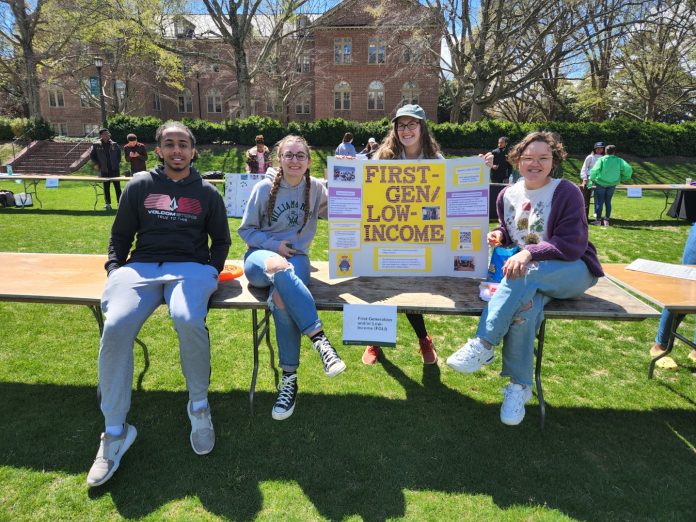Community, empowerment and awareness are three of the words most fundamental to the mission of the First Generation and Low Income Student Organization at the College of William and Mary. Founded in 2020 by Jonathan Diaz-Ramos ’21, Vanessa Guzman ’21 and Tyler Patton ’21, FGLI has become a deeply integral part of many of its members’ time at the College as a space where they can navigate the challenges associated with being first generation, low-income, or both on campus together.
“It’s so nice to just have people who understand where you come from and your background.” -Stormy Smith ’23
On campus, only nine percent of the class of 2026 are first generation according to the Office of Admissions, which is small when compared to the national average of about 33%. Additionally, roughly 17% are Pell-Grant recipients while the national average totals to approximately 33%.
“I remember when I came on campus, I felt kind of lonely,” FGLI co-president Orley Estrada ’23 said. “And it was due to the fact that I couldn’t really identify with a lot of the students on campus who were high income.”
Estrada’s sentiment was shared by other members of FGLI, such as Communications and Membership Chair Stormy Smith ‘23, who explains how daunting the lack of knowledge coming in is for first generation students .
“It was really hard my freshman year,” Smith said. “I felt like it was hard to find a community of people because everyone was much more upper class. They had a much better handle on college in general and the ins and outs.”
A large part of the reason FGLI is so meaningful to its members is that it represents a community with whom members can relate to on their shared experiences at the College.
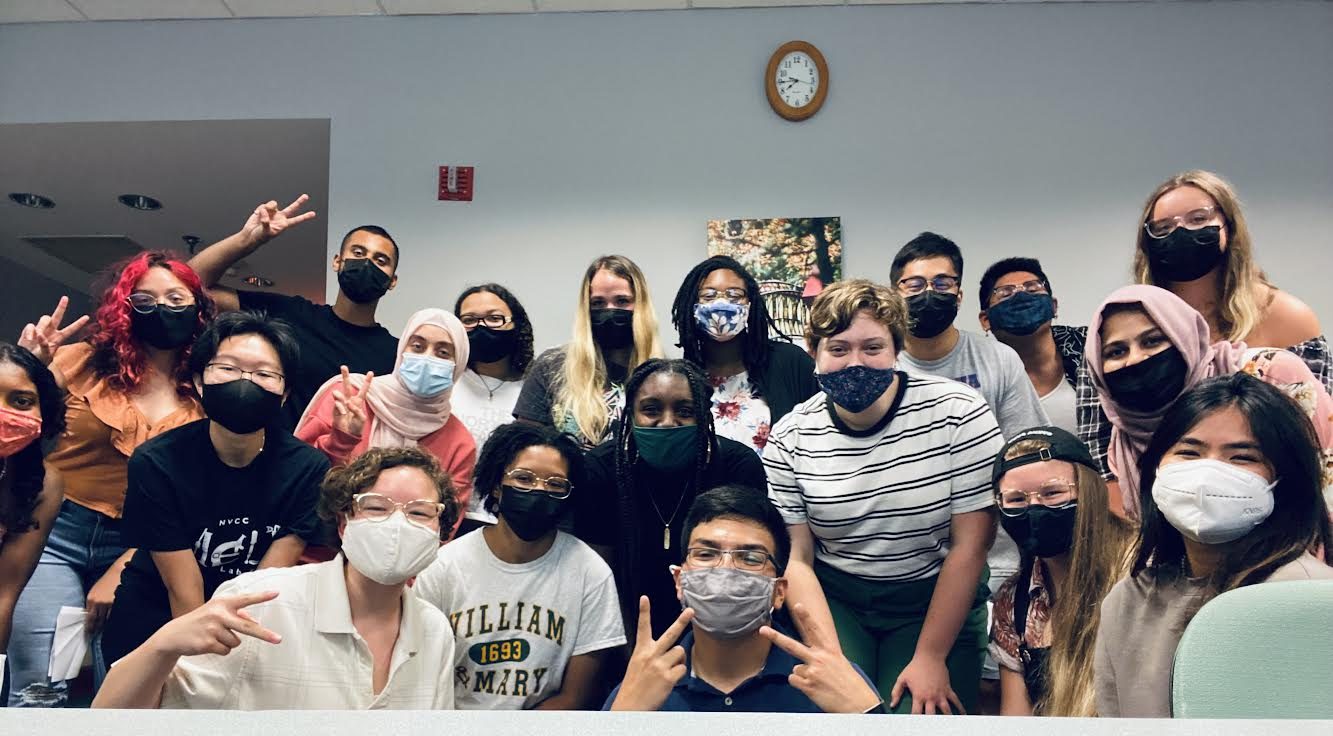
“I’ve gotten so close with so many of my exec board members and general members who just come to the meetings every week,” Smith said. “It’s so nice to just have people who understand where you come from and your background.”
As important as community building is, it is not the only important aim of FGLI. Empowerment is another critical guiding principle of the organization.
“I would say the overall goal is empowerment,” Estrada said. “We want to empower FGLI students to feel accepted … on this campus specifically.”
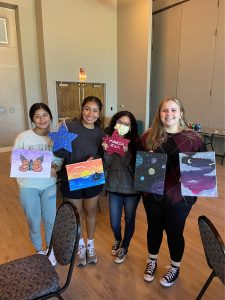
FGLI empowers its membership in a very direct way by hosting empowerment sessions, where members are encouraged to confront common issues faced within the FGLI community head-on.
“We have empowerment sessions, which are where we kind of talk about issues within the FGLI community or just things like imposter syndrome or stress culture, things of that nature,” Smith said.
In addition to empowerment sessions, Smith described many other types of events FGLI has put on, such as workshops that teach college-related skills like declaring a major, making a resume, and getting involved with research. They also host non-academic focused activities geared at social and mental wellness.
One of the most memorable events among members that FGLI has organized to date was a guest lecture from Mari Carmen Aponte, former United States ambassador to El Salvador, as a joint initiative with the College’s Latin American Student Union.
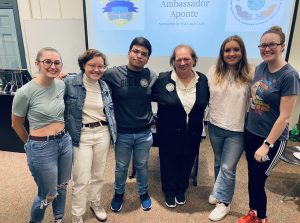
“She talked about her experiences growing up as a minority student and how she, as a Hispanic individual, came into law school through affirmative action,” Estrada said, “And she said that when she grew up, she had a stigma — she thought she wasn’t worthwhile as an individual going to these prestigious schools that she went to. And all of the students in our organization identified with her because they’re the first people in their family to go to school — specifically college.”
Estrada was not the only one to highlight how special Aponte’s story was.
“That was just a really powerful event in a lot of ways, so many people came together for that event,” FGLI Advocacy Chair Hannah Dow ’23 said.
FGLI also makes a concerted effort to spread awareness about the difficulties first generation and low-income students deal with on campus. Many of the initiatives FGLI puts on have awareness as a major focus.
“We just kind of try to raise awareness of what struggles students face on campus because we understand that they’re not top of mind for people who haven’t had that experience,” Dow said. “We recently just did an initiative where we got 300 FGLI stickers that say ‘I support FGLI,’ and we went up to our professors and were like, ‘Hey, can you put these up in your office?’ It just helps to see something, that even if you’re not a FGLI student yourself, it says you support them and that was amazing.”
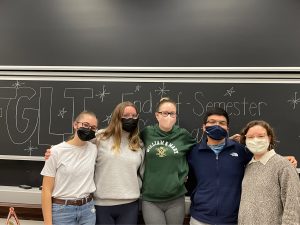
Another crucial aspect of FGLI is the relationship between the organization and the administration here at the College, specifically President Katherine Rowe. FGLI works diligently to advocate for and communicate the advantages of policies that support first generation and low-income students. This work has borne fruit in some areas, but there are still many areas where members would like to see continued change.
“The administration does respond to us,” Dow said. “I just hope FGLI students know that they have a community and that I truly believe the administration wants to support them but needs our help.”
The biggest win that first generation and low-income students have seen with respect to policy is the recent announcement of a Pell Grant scholarship by the College, which covers full tuition and fees for in-state Pell Grant-eligible students.
“I think our constant communication with President Rowe has been really great,” Estrada said, “I think we have seen that President Rowe has taken a big initiative in trying to help FGLI students — specifically this scholarship policy where they’re going to give in-state tuition to FGLI students, which has come in part because of our student organization making her aware of this are these issues.”
As this policy will surely lead to an influx of FGLI students at the College, FGLI members want to make sure these newcomers know that there is an open space for them.
“With the Pell Grant, I think it’s even more important to have that recognition of ‘it’s okay, no stigma’ and ‘we have a club for you, come join us,’” Smith said.
Members say still more work needs to be done in recognizing the needs of FGLI students. The $40 lockout policy, for example, was frequently criticized for placing a disproportionate burden on FGLI students.
“I think this lockout policy that the school initiated systematically creates a barrier for FGLI students,” Estrada said.
In discussing this same policy, Dow reiterated the role of the FGLI student organization as an intermediary between the administration and FGLI students.
“The lockout policy came out and it was like, ‘Alright, clearly someone was forgotten in this,’” Dow said. “And so it’s our job to go to the administration and say, ‘Hey, what about us?’”
Another step that FGLI would like to see be taken, especially in light of the fact that the first generation and low-income student population will continue to grow over coming years, is the creation of a staff position exclusively focused on supporting FGLI students.
“I don’t think people realize we have a faculty advisor for FGLI, but we don’t have any administrator that’s solely dedicated to helping FGLI students,” Dow said. “And yet it’s such a distinct identity that I think there needs to be that one person that people can go to.”
“We want to empower FGLI students to feel accepted … on this campus specifically.” -Orley Estrada ’23
In all, the FGLI student organization is a tight-knit community of individuals that focuses on empowering and advocating for first generation and low-income students on campus. Despite being a very young club, it has had a tremendously positive impact, both internally through the many events it puts on and on the campus at large through meetings and dialogues with administration. This impact will undoubtedly continue to grow as more FGLI students come to the College, join the club and further the FGLI mission of making the College a welcoming and supportive place for all.
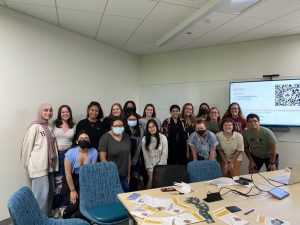
CORRECTION (11/16): A previous version of this article included a quote that has now been changed for clarity.

